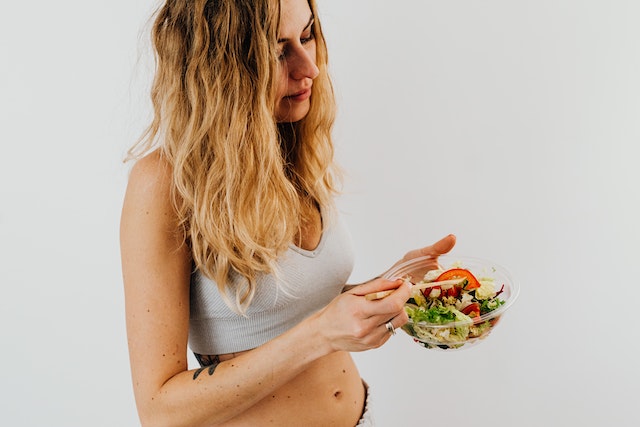Getting back in shape after giving birth is a common goal for many women.
Maybe your clothing is too tight, or you just plain feel unconfident and want to start the new year off on the right foot physically.
No matter your motivation, there are several effective strategies for losing weight and keeping it off.
Many of us would love to have our pre-pregnancy bodies back immediately after giving birth, but the truth is that no one, not even celebrities, can do so.
We've learned the hard way that it's not always easy to get back to a healthy weight after having a baby.
Dealing with a newborn, establishing a new routine, and healing from childbirth may all be very demanding. You can say that it's a lot.
However, if you want to have more children in the future, you should go back to a healthy weight soon after giving birth.
Here we'll go over some tried-and-true strategies for getting back into shape after giving birth so you can tackle parenthood with confidence.
Learn more about "baby weight," why it occurs during pregnancy, and why it's not necessary once a baby is born.
During delivery, most women lose between five and ten pounds due to the size of their newborns and the weight of their amniotic fluid and placentas, respectively.
A healthy pregnancy weight gain for a woman of average weight is 25 to 35 pounds.
Also, the advice of your healthcare team may vary depending on your specific circumstances.
According to studies published in the American Journal of Obstetrics & Gynecology, the following factors contribute to maternal weight growth during pregnancy:
- The baby
- Blood
- Placenta
- Uterus Enlargement
- Extra fat stores
- Amniotic Fluid
- Breast Tissue
Gaining weight before giving birth and when breastfeeding serves as an energy reserve. However, gaining too much weight can cause you to become overweight.
This is what most people mean when they talk about having "baby weight," and it's extremely common.
Half of pregnant women acquire more than the healthy amount of weight.
The risks of maintaining even a little amount of pregnancy weight gain after giving birth are as follows:
- Potential for gaining weight
- Diabetes and cardiovascular disease risk increases
- Higher potential for pregnancy-related problems
- Having gestational diabetes poses more dangers to a woman's health.
If you're looking to trim down, the following are some tried-and-true methods that have been shown to work.
Efficient Way to Lose the Baby Weight
Here are some strategies to help you slim down after giving birth and get back into your pre-pregnancy clothes.
Planning Realistic Weight Loss Objectives After Childbirth
Weight loss will be gradual after giving birth. If you want to move things forwards more quickly, you and your doctor might discuss setting a target that is both healthy and achievable.
Aim for a deficit of 3,500 to 5,250 calories per week (or 500 to 750 calories per day) to lose no more than one and a half pounds per week.
Although many mums have lost the majority of their pregnancy weight by their child's sixth month birthday, weight loss occurs at varying rates for each individual. It's been established that many things influence the success or failure of a weight loss effort.
For starters, your chronological age: As a result, you burn fewer calories at rest and gain weight beyond age 25. This slowing of your metabolism occurs at a rate of roughly 2% per decade.
Your diet also plays a role; eating more protein than carbohydrates and having your largest meals first thing in the morning helps your body burn more fat and function more effectively.
Finally, other elements include your activity level (the more you move, the more calories you burn) and your genetically predetermined resting metabolic rate.
It's important to remember that it may take an additional 10 months to two years to get back into shape after pregnancy, especially if you gained more than 35 pounds.
We have a wide selection of baby change tables for your nursery.
It Is Not Necessary to Go on a Diet
Losing weight after pregnancy may be more difficult if you decide to go on a "diet."
Stress from your new position as a mother, combined with the emotional toll of feeling deprived of your favourite meals, may contribute to your weight increase.
Most women find that their weight drops off quite naturally if they return to a diet of nutritious, whole foods and eating only when they are truly hungry.
We suggest eating a wide variety of healthy foods instead than dieting.
If you want to avoid feeling hungry and have energy to go through the day, stock up on a variety of snacks. Apple slices, carrot sticks, and wheat crackers, to name a few, are completely useless.
Preserve a Healthy, Balanced Diet After Giving Birth
No matter how eager you are to get back into your pre-pregnancy clothes, you should put off dieting until at least six weeks after giving birth. This is because your body needs plenty of rest and nutrients to recover from delivery, fight infection, and feed your baby.
Make sure you're still eating enough calories after giving birth before beginning a postpartum diet.
If you're nursing and you don't get enough calories, your body will stop making as much milk, so your hungry, growing baby will also go on a diet.
Furthermore, if fat is burned too rapidly, toxins may be released and pass into breast milk.
Eating too few calories might trick your body into thinking it's starving, even if you aren't nursing.
Disorientation might lower your metabolism, making it tougher to lose weight over the long term.
If you plan on breastfeeding, keep in mind that your calorie demands in the first six months after giving birth will be considerably higher than they were in the third trimester of pregnancy.
Because your calorie needs will vary depending on factors like your pre-pregnancy body mass index and how active you are, it's best to get advice from a medical professional.
To put this in perspective, a typical adult female requires around 2,000 calories per day, and breastfeeding mothers should consume an additional 500 calories per day to prevent weight loss.
However, it takes a calorie deficit of 3,500 per week, or 500 fewer calories per day, to lose one pound, so the average breastfeeding woman would need to return to 2,000 calories per day to lose around a pound per week with diet and exercise alone.
Be sure that the foods you do eat are rich in the nutrients you need.
It's important to keep in mind that the less weight you have, the fewer calories your body requires, so you may need to make some changes to your diet as you lose weight.
Fill Up on Healthy “Superfoods”
New mothers, especially those who are breastfeeding, have increased dietary requirements. Foods that are high in the nutrients you need and low in calories and fat should be your priority.
One of these "superfoods" is fish, because it is rich in DHA, an omega-3 fatty acid that is crucial for your newborn's brain and nervous system development.
Salmon, sardines, and tuna are some of the greatest cold-water seafood to consume in order to get your daily DHA intake (stick to canned light tuna because albacore tends to be high in mercury).
Bone-strengthening calcium is abundant in dairy products like milk and yoghurt, making these foods another category of superfoods.
Add some protein to your diet as well. Low-fat, high-protein, and fiber-rich foods like lean beef, chicken, and beans. They're healthy, and they'll help you avoid feeling hungry between meals.

Control Your Calorie Intake
Some people just can't get into calorie counting. If you find that eating intuitively isn't working for you, calorie counting might help you determine how much food you're consuming and where the weaknesses in your diet lie.
It can also help you make sure you're getting enough of the calories you need to keep you going strong and healthy.
Here's how:
- Maintaining a food journal
- Snapping photos of your meals to help you keep track of what you've consumed
- Taking use of a calorie counter app
- Keeping each other accountable by sharing your daily calorie consumption with a friend who is also keeping track of their own
As a result of using these methods, you will be able to cut down on your food intake and make better decisions when it comes to your diet.
Eat Foods High in Fiber
So, it's time to make a grocery list that includes some whole grains and vegetables. Fibre-rich diets have been scientifically proven to aid in slimming down.
An increase of 4 grams of fibre over what participants had been eating prior to the survey resulted in an additional weight loss of 3 1/4 pounds on average over the course of six months, according to a 2019 study of 345 people.
A research trial conducted in 2015 found that consuming foods high in soluble fibre (like these!) slowed digestion and reduced hunger hormone levels, leading to a more sustained feeling of fullness.
Although studies show conflicting outcomes, these digestive effects may aid in calorie restriction.
Are you trying to find the best portable cot for your baby's room? It's all taken care of at My Baby Nursery.
Fill Up on Protein-Rich Foods
Protein in the diet has been shown to improve metabolism, kerb appetite, and cut calorie consumption.
Protein, compared to other nutrients, has a far larger "thermic" effect, according to studies. Therefore, more calories will be expended during digestion than with other foods.
Additional studies have shown that eating protein can help you feel full faster and eat less overall. It does this by lowering your hunger hormone ghrelin and increasing your fullness hormones GLP and GLP-1. Less hunger hormones mean less hangry-ness!
Among the best protein-rich foods are:
- Dairy
- Lean meats
- Legumes
- Low mercury fish
- Eggs
- Nuts and seeds
Always Have Some Healthy Snacks on Hand
The items you keep on hand might have a major impact on what you eat. And while you're digging through the cupboards for a snack, a nutritious option is what you need.
By keeping a supply of nutritious munchies on hand, you can always have something to eat when the craving arises. The following are some that you should stock up on:
- Breakfast of Greek yoghurt and granola
- Ready-to-eat salad and hummus
- String cheese
- Seaweed snacks
- Snack mix of dried fruits and nuts
- Air-popped popcorn
- Flavorful nuts
There is some evidence that putting fruit in plain sight can help keep the weight down (BMI).
Also, similar research found that keeping unhealthy items visible on the counter tops is related with greater weight gain.
If you want to lose weight, it's important to avoid eating processed and sugary foods.
Cut Back on Refined Carbohydrates and Added Sugars
Sugar and refined carbohydrates are tasty, but they are poor dietary choices because of their high calorie and low nutritional content. There are also tasty and nutritious options.
Excessive use of added sugar and processed carbohydrates has been linked to an array of health issues, including but not limited to obesity, diabetes, heart disease, some malignancies, and even memory loss.
Common examples of foods and drinks that include added sugars include:
- Biscuits
- Pastries
- Sugary drinks
- Sweet spreads
- Fruit juice
- White flour
- Cakes
- Any refined sugar
Food labels are important to read when making grocery purchases. You should probably stay away from a product, for instance, if sugar is listed first among its ingredients.
If you consume more whole foods like vegetables, legumes, fruits, meats, fish, eggs, nuts, and yoghurt, you may easily lower your sugar intake.
FAQS About Losing Weight After Pregnancy
Just like at any other time in life, losing weight after pregnancy means using up more calories than you consume. You can lose the extra pounds gained during pregnancy by combining consistent healthy eating habits with regular postpartum exercise over the course of several months.
Breastfeeding may contribute to postpartum weight loss in some women, though not all nursing mothers notice an effect. To lose your baby weight, eat protein- and fiber-rich whole foods, stay hydrated, and exercise. Also, avoid eating fewer than 1500–1800 calories per day, as this may affect your milk supply.
Postpartum exercise: When it's safe to start running and lifting after pregnancy. Most patients should wait at least 12 weeks after giving birth to resume running or lifting weights. Cardio exercise and weight training are two great ways for women to clear their minds and build strong, healthy bodies.
In a study that followed 900 women for a year after childbirth, researchers found that those who regularly walked were less likely to retain their extra pregnancy weight.
Try eating more whole grains, fruits, and vegetables, and start incorporating good lean proteins and low fat dairy into your meals. Also be sure that you're well hydrated, especially if you're exercising. If you don't drink enough water or eat enough healthy calories, you might see your milk supply decrease.
Consume Less Processed Foods
If you've been paying attention, you'll know that eating complete, unprocessed meals makes a huge difference in how easy it is to follow many of these suggestions. Protein, fibre, and low sugar content are typical of such foods.
However, the National Institutes of Health reports that eating a lot of processed foods can undermine your attempts to lose weight because they tend to be heavy in sugar, bad fats, salt, and calories (NIH).
Products in this category include:
- Prepackaged foods
- Ready meals
- Boxed mixes
- Fast foods
- Processed cheeses
- Sugary cereals
- Chips
- Cookies and baked goods
- Candy
Additionally, studies have linked eating processed meals to an increase in compulsive overeating.
The sad truth is that these items make up a significant portion of many people's daily diets.
Changing to more fresh, whole, and nutrient-dense foods will help you cut back on your consumption of processed foods.
Avoid Alcoholic Beverages
Researchers have discovered that drinking moderate amounts of alcohol, such as a glass of red wine, can have positive effects on health.
However, when trying to lose weight, alcohol should be avoided because it adds empty calories with no nutritional value.
In addition, there is some evidence that alcohol consumption is linked to an increase in visceral fat, or belly fat.
As far as we know, there is no amount of alcohol that is safe for newborns. The Centers for Disease Control and Prevention (CDC) agrees that pregnant women and breastfeeding mums should not consume alcohol.
We suggest something sugar-free and bubbly, like flavoured sparkling water, for those times when you just want to celebrate.
Breastfeed
Some research suggests that exclusive breastfeeding helps speed up weight loss and return you to your pre-baby size, although this is still debated. Others, however, find no distinction in weight loss between mothers who breastfeed and those who use formula.
Breastfeeding is completely safe and beneficial for your kid. It helps the infant's immune system develop and provides many other vital health benefits.
And if you're breastfeeding full-time, you can increase your calorie intake by roughly 300 per day (you can add slightly more calories if you have a considerable eater or twins).
Don't let the fact that you're breastfeeding give you permission to binge on unhealthy foods.
It may take less "effort" (or at least fewer hours of pounding out your workout on the treadmill) than you think to lose those extra 10, 20, or more pounds after giving birth.
Since breastfeeding aids in rapid fat loss, this is why. Ask any new mother.
Up to 500 calories a day can be burned while breastfeeding, depending on milk production.
In addition, it triggers the production of hormones that reduce the size of both the uterus and the belly after giving birth.
Unfortunately, you don't need to keep on an extra five pounds of weight as a reserve while you nurse, so you might have to put in a little extra work at the gym to lose those last few pounds.
In comparison to when you were still nursing, your body will burn fewer calories once you stop.
However, you may find that your hunger drops as you wean; this is your body's way of telling you to follow a healthy diet plan (so do what it says).
You may also find that you have more energy to devote to physical pursuits. If you're concerned about gaining weight once you stop nursing, you needn't.
Keeping your metabolism revved up requires some calorie restriction, but it's worth it to keep the weight from creeping back up if you make some positive changes to your lifestyle.
Drink Up
You may avoid being dehydrated throughout the day by drinking plenty of water.
Plus, it helps you feel full on fewer calories, and preliminary study suggests it may even rev up your metabolism.
The suggested amount of water—eight glasses—may not be necessary for you, so instead, you should gauge your water intake based on the colour of your urine and the frequency with which you have to use the restroom.
If you're getting the right amount of water in your diet, you should have clear urine and urinate roughly once every three to four hours.

Get Going!
The diet is a vital aspect of any postpartum weight loss strategy, but it is not the only part.
Aerobic and strength training workouts can help you burn fat and maintain strong muscles and bones after giving birth.
Exercising as a new mother has several advantages, and not just because it helps you shed extra pounds.
Having a new baby in the family can be stressful, and this helps with sadness, the sleep problem, and stress relief.
Going for a brisk walk while pushing your baby in a stroller is a great way to get your heart rate up and your muscles working again after giving birth.
At least 150 minutes each week is recommended. If you're having trouble finding 30 minutes to yourself, try splitting it up into three 10-minute chunks. Then see if you can gradually increase your sessions to 20 or 30 minutes.
Even if carrying a kid around all day is a workout in and of itself, you should also incorporate strength training into your routine.
You can use things like soup cans or other light weights as resistance. Additionally, many fitness centres and community centres provide "mommy and me" sessions that allow you to bring your child along with you as you exercise.
Get your doctor's okay before beginning any workout regimen, especially if you had a C-section.
Working out is excellent for you. In spite of your hectic schedule, you can get moving with your newborn by doing something as easy as putting them in a stroller or carrier.
Because of your sleep deprivation, you shouldn't push yourself too hard in the gym. Instead, you should wait until your doctor gives the green light before returning to your regular routine.
Whether it's jogging, yoga, cycling, swimming, or just walking, find an activity you enjoy and make it a regular part of your week.
A quick stroll with the baby in a nearby park or playground can help you get back in shape after giving birth, and it's also a fantastic way to meet other mums who may be on a similar journey.
Get Some Sleep
Sleep deprivation may make it more challenging to lose the baby weight, even if it may seem impossible to achieve a total of eight hours of sleep when you have a baby, calling you like clockwork throughout the night.
Women who slept fewer than five hours per night after giving birth were shown to be more likely to maintain their pregnancy weight than those who slept seven or more hours per night.
Tiredness triggers the release of stress chemicals like cortisol, which can make you hungry and cause weight gain.
And lastly, when you're tired, you don't have the motivation to take care of yourself properly. This makes it more difficult to make nutritious eating decisions.
Drive-throughs are more convenient for quick purchases. You're less likely to exercise, which is a bummer.
The advice to "sleep when your baby sleeps" is sound.
Until your baby begins sleeping through the night, it is recommended that you get as many naps as possible throughout the day and turn in early.
Ask for Help
Seek medical attention and advice from a dietician if you can't seem to shed the pounds on your own.
The doctor can advise you on how much weight you need to lose and when you can begin exercising, while the dietician can help you create an eating plan that will allow you to do so safely and successfully.
Conclusion
It's not always easy to get back to a healthy weight after having a baby. There are several effective strategies for losing weight and keeping it off. Most women lose between five and ten pounds due to the size of their newborns and the weight of their amniotic fluid and placentas. Many mums have lost the majority of their pregnancy weight by their child's sixth month birthday. Aim for a deficit of 3,500 to 5,250 calories per week (or 500 to 750 calories per day) to lose no more than one and a half pounds per week.
It may take an additional 10 months to get back into shape after pregnancy. New mothers have increased dietary requirements, especially those who are breastfeeding. Eating too few calories might trick your body into thinking it's starving, even if you aren't nursing. Foods that are high in the nutrients you need and low in calories and fat should be your priority. Calorie counting might help you determine how much food you're consuming and where the weaknesses in your diet lie.
Fibre-rich diets have been scientifically proven to aid in slimming down. Add some protein to your diet as well. Low-fat, high-protein, and fiber-rich foods like lean beef, chicken, and beans are healthy. If you want to lose weight, it's important to avoid eating processed and sugary foods. There are also tasty and nutritious options that you can keep on hand.
Eating complete, unprocessed meals makes a huge difference in how easy it is to follow these suggestions. If you're breastfeeding full-time, you can increase your calorie intake by roughly 300 per day. There is no amount of alcohol that is safe for newborns. The Centers for Disease Control and Prevention (CDC) agrees that pregnant women and breastfeeding mums should not consume alcohol. Exercising as a new mother has several advantages, and not just because it helps you shed extra pounds.
Aerobic and strength training workouts can help you burn fat and maintain strong muscles and bones. Many fitness centres and community centres provide "mommy and me" sessions that allow you to bring your child along with you as you exercise. A quick stroll in a local park or playground can help you get back in shape after giving birth. Until your baby sleeps through the night, it is recommended that you get as many naps as possible. Seek medical advice and advice from a dietician if you can't seem to shed the pounds on your own.
Content Summary
- Getting back in shape after giving birth is a common goal for many women.
- No matter your motivation, there are several effective strategies for losing weight and keeping it off.
- We've learned the hard way that it's not always easy to get back to a healthy weight after having a baby.
- However, if you want to have more children in the future, you should go back to a healthy weight soon after giving birth.
- Here we'll go over some tried-and-true strategies for getting back into shape after giving birth so you can tackle parenthood with confidence.
- Learn more about "baby weight," why it occurs during pregnancy, and why it's not necessary once a baby is born.
- A healthy pregnancy weight gain for a woman of average weight is 25 to 35 pounds.
- However, gaining too much weight can cause you to become overweight.
- Half of pregnant women acquire more than the healthy amount of weight.
- The risks of maintaining even a little amount of pregnancy weight gain after giving birth are as follows:
- Diabetes and cardiovascular disease risk increases Higher potential for pregnancy-related problems
- Having gestational diabetes poses more dangers to a woman's health.
- Weight loss will be gradual after giving birth.
- If you want to move things forwards more quickly, you and your doctor might discuss setting a target that is both healthy and achievable.
- Aim for a deficit of 3,500 to 5,250 calories per week (or 500 to 750 calories per day) to lose no more than one and a half pounds per week.
- It's important to remember that it may take an additional 10 months to two years to get back into shape after pregnancy, especially if you gained more than 35 pounds.
- Losing weight after pregnancy may be more difficult if you decide to go on a "diet."
- We suggest eating a wide variety of healthy foods instead than dieting.
- No matter how eager you are to get back into your pre-pregnancy clothes, you should put off dieting until at least six weeks after giving birth.
- This is because your body needs plenty of rest and nutrients to recover from delivery, fight infection, and feed your baby.
- Make sure you're still eating enough calories after giving birth before beginning a postpartum diet.
- If you're nursing and you don't get enough calories, your body will stop making as much milk, so your hungry, growing baby will also go on a diet.
- Eating too few calories might trick your body into thinking it's starving, even if you aren't nursing.
- If you plan on breastfeeding, keep in mind that your calorie demands in the first six months after giving birth will be considerably higher than they were in the third trimester of pregnancy.
- Be sure that the foods you do eat are rich in the nutrients you need.
- It's important to keep in mind that the less weight you have, the fewer calories your body requires, so you may need to make some changes to your diet as you lose weight.
- New mothers, especially those who are breastfeeding, have increased dietary requirements.
- Foods that are high in the nutrients you need and low in calories and fat should be your priority.
- Add some protein to your diet as well.
- Low-fat, high-protein, and fiber-rich foods like lean beef, chicken, and beans.
- Some people just can't get into calorie counting.
- If you find that eating intuitively isn't working for you, calorie counting might help you determine how much food you're consuming and where the weaknesses in your diet lie.
- So, it's time to make a grocery list that includes some whole grains and vegetables.
- Fibre-rich diets have been scientifically proven to aid in slimming down.
- A research trial conducted in 2015 found that consuming foods high in soluble fibre (like these!)
- Protein in the diet has been shown to improve metabolism, kerb appetite, and cut calorie consumption.
- The items you keep on hand might have a major impact on what you eat.
- By keeping a supply of nutritious munchies on hand, you can always have something to eat when the craving arises.
- Also, similar research found that keeping unhealthy items visible on the counter tops is related with greater weight gain.
- If you want to lose weight, it's important to avoid eating processed and sugary foods.
- There are also tasty and nutritious options.
- Excessive use of added sugar and processed carbohydrates has been linked to an array of health issues, including but not limited to obesity, diabetes, heart disease, some malignancies, and even memory loss.
- However, the National Institutes of Health reports that eating a lot of processed foods can undermine your attempts to lose weight because they tend to be heavy in sugar, bad fats, salt, and calories (NIH).
- Researchers have discovered that drinking moderate amounts of alcohol, such as a glass of red wine, can have positive effects on health.
- However, when trying to lose weight, alcohol should be avoided because it adds empty calories with no nutritional value.
- In addition, there is some evidence that alcohol consumption is linked to an increase in visceral fat, or belly fat.
- As far as we know, there is no amount of alcohol that is safe for newborns.
- Don't let the fact that you're breastfeeding give you permission to binge on unhealthy foods.
- Since breastfeeding aids in rapid fat loss, this is why.
- Up to 500 calories a day can be burned while breastfeeding, depending on milk production.
- However, you may find that your hunger drops as you wean; this is your body's way of telling you to follow a healthy diet plan (so do what it says).
- You may avoid being dehydrated throughout the day by drinking plenty of water.
- If you're getting the right amount of water in your diet, you should have clear urine and urinate roughly once every three to four hours.
- The diet is a vital aspect of any postpartum weight loss strategy, but it is not the only part.
- Aerobic and strength training workouts can help you burn fat and maintain strong muscles and bones after giving birth.
- Going for a brisk walk while pushing your baby in a stroller is a great way to get your heart rate up and your muscles working again after giving birth.
- Working out is excellent for you.
- Instead, you should wait until your doctor gives the green light before returning to your regular routine.
- Whether it's jogging, yoga, cycling, swimming, or just walking, find an activity you enjoy and make it a regular part of your week.
- A quick stroll with the baby in a nearby park or playground can help you get back in shape after giving birth, and it's also a fantastic way to meet other mums who may be on a similar journey.
- Sleep deprivation may make it more challenging to lose the baby weight, even if it may seem impossible to achieve a total of eight hours of sleep when you have a baby, calling you like clockwork throughout the night.
- And lastly, when you're tired, you don't have the motivation to take care of yourself properly.
- Drive-throughs are more convenient for quick purchases.
- The advice to "sleep when your baby sleeps" is sound.
- Until your baby begins sleeping through the night, it is recommended that you get as many naps as possible throughout the day and turn in early.
- Seek medical attention and advice from a dietician if you can't seem to shed the pounds on your own.






